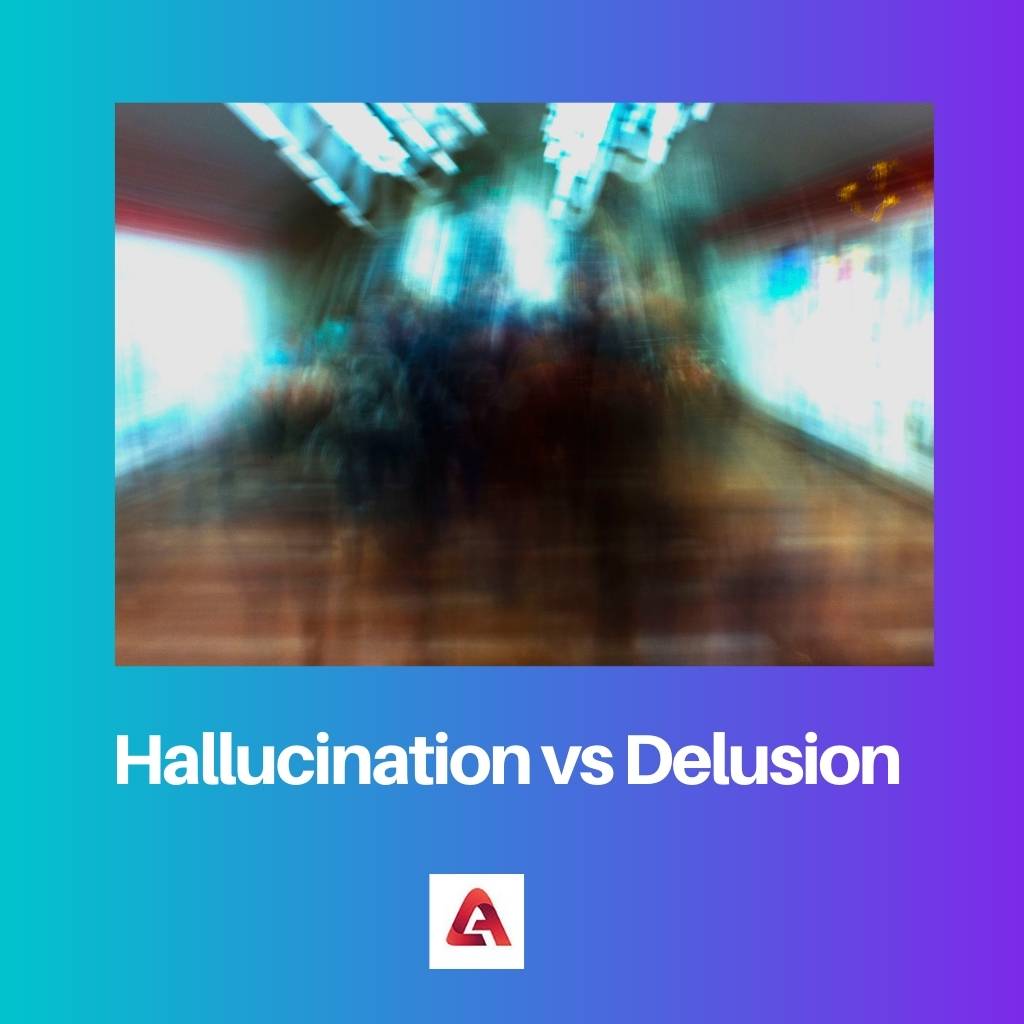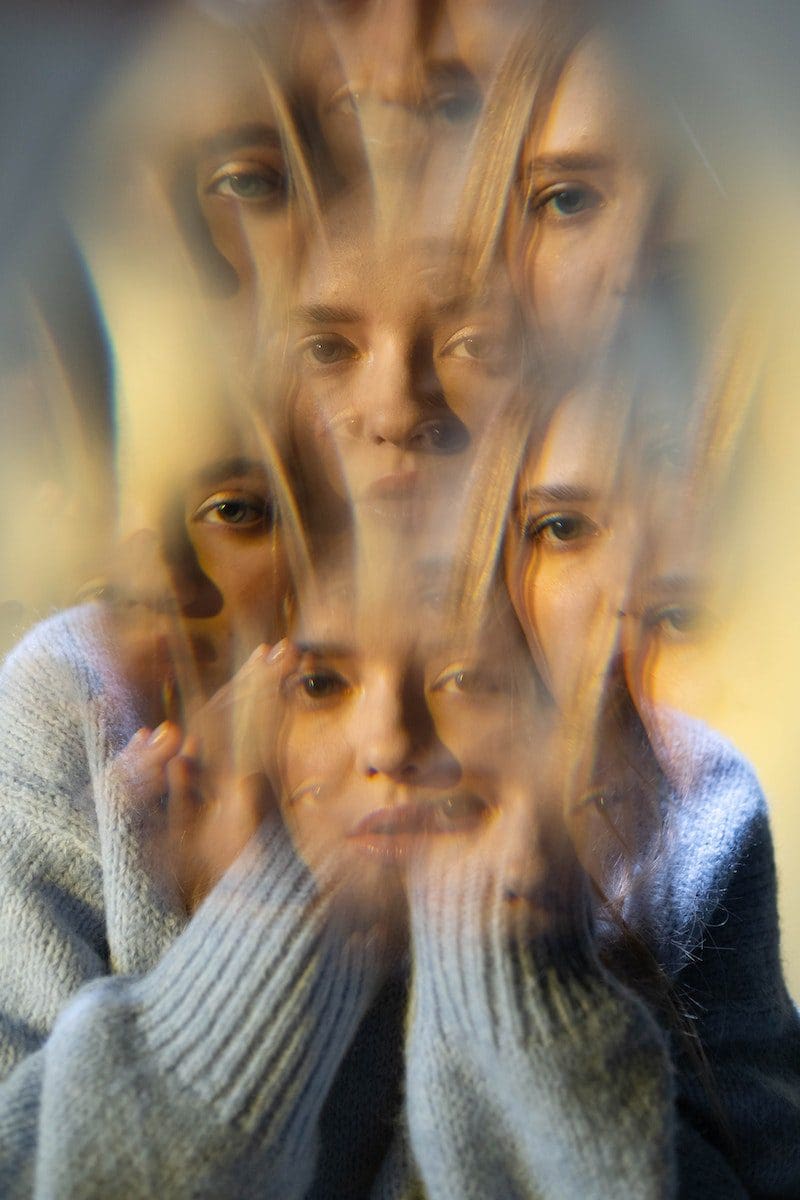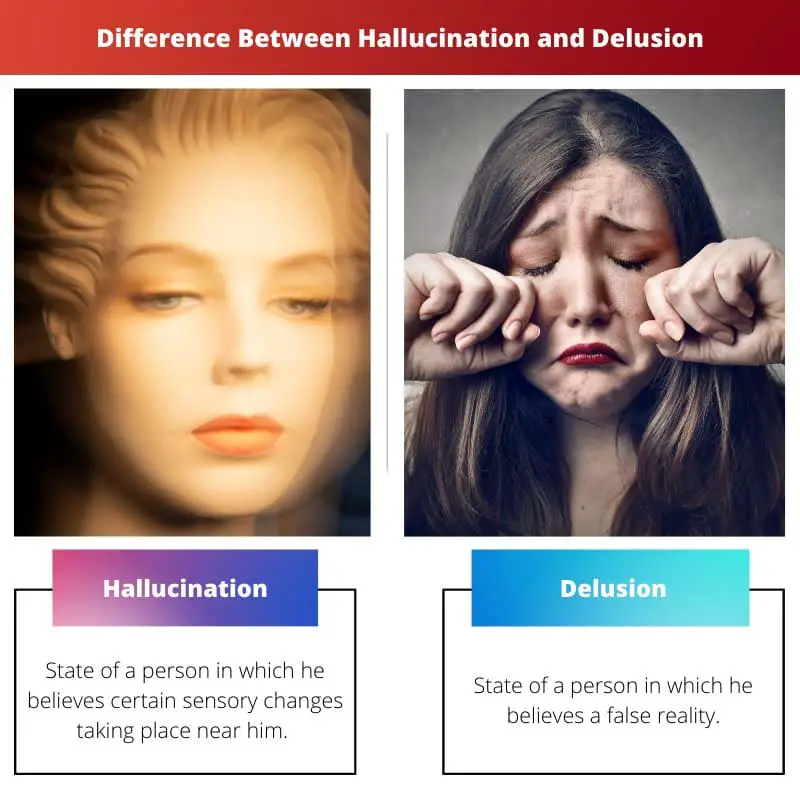In the past few years, a number of diseases have been diagnosed that are related to mental conditions and the perceptions of people related to society’s norms or beliefs.
These diseases or disorders have been highly researched in the past years, and multiple reasons behind them and their cures have been found to some extent.
Similarly to this kind, two such disorders are hallucinations and delusions.
While both of these are presumed with the perception of one’s brain, these two are considerably different from one another and carry a lot of differences.
Key Takeaways
- Hallucinations involve false sensory experiences, while delusions are false beliefs.
- Hallucinations can occur in any sensory modality, such as vision or hearing, while delusions are strictly cognitive.
- Schizophrenia, dementia, and substance abuse are common causes of hallucinations, whereas delusions can be symptoms of schizophrenia, bipolar disorder, or delusional disorder.
Hallucination vs Delusion
Hallucinations are sensory experiences that occur in the absence of any external stimuli. They can involve any of the five senses (sight, sound, smell, taste, and touch). Delusions are false beliefs that are not based on reality and are not subject to change, even when presented with evidence to the contrary.

Hallucination as a state is more of a thing inside the brain of a person rather than existing in the external environment.
When a person is said to suffer from hallucination, it implies that the person feels, listens, or sees particular things which do not exist in reality.
But on the contrary, Delusion happens to be slightly different. Rather than a thing related to the senses of a person, it refers to the belief of a person related to a particular thing.
It is called Delusion when the belief stands in a particular place that is completely against the actual reality.
Comparison Table
| Parameters of Comparison | Hallucination | Delusion |
|---|---|---|
| Meaning | State of a person in which he believes certain sensory changes taking place near him. | State of a person in which he believes a false reality. |
| Causes | Happens due to lack of sleep, influence of alcohol or influence of drugs, etc. | Happens due to certain psychological conditions such as depression. |
| Symptoms | The affected person might hear sounds or see things. | The affected person will believe something untrue and sound bizarre to other people. |
| Treatment | It can be treated by way of medication alone. | It will need medication along with therapy. |
| Affects | Senses of a person | Believes of a person. |
| Example | Hearing footsteps even when no one is walking. | Believing someone is talking behind your back even if he is not. |
What is Hallucination?
Hallucination can be explained as the neurological or psychological condition belonging to a person in which the person believes that his senses are sensing a certain thing that does not exist in reality in front of other people.
There are many reasons behind this situation, and most of them are not because of any mental illness or psychological disorder.
As per the research that has been conducted till today, it has been concluded that hallucinations can be caused by many factors, and some of the most popular ones are the lack of sleep, the influence of any drug, the influence of medicine, or the influence of alcohol, etc.
All these things play a kind of mind game with the person and make him believe that a particular thing is happening around him even when it is not.
This can be better explained by way of an example- suppose a person hears footsteps even when no one is walking around him.
This is called a hallucination because it affects the hearing sense of that person and makes him believe that someone is walking even when someone is not.

What is Delusion?
Talking about Delusion is an underlying state in a person, and it can better be explained by the beliefs of that particular person.
Delusion is not some kind of illness but more of the perception of a person where a person believes the occurrence of a certain event which is not happening in the real world the unique feature about this state is that even if we present evidence to the person telling him that what he believes is not true, he is not going to change his perception.
As per the experts in the related field, delusion is caused due to certain neurological situations such as anxiety, depression, violent childhood, etc.
When a person suffers from any of these conditions, he makes perceptions about people which are not true, but he believes them to be true based on his past experiences.
An example can be a person who believes that his mother is feeding drugs to him by way of the meal, although there is enough evidence that no such thing is happening.
One important thing about Delusion is that despite any effort made in the right direction, the belief of the person can hardly be changed.

Main Differences Between Hallucination and Delusion
- Hallucination is caused when there is a hindrance in the sensory perception of a person, but delusion is caused when there is a hindrance in the perception of reality related to a person.
- Hallucination is caused by factors like lack of sleep or the influence of alcohol, while delusion is caused by certain mental illnesses such as depression or anxiety.
- To treat hallucination, certain medications are required, but to treat delusion, medication along with therapy is required.
- Hallucination affects the senses of a person, while delusion affects the beliefs of a person.
- An example of hallucination is hearing bell sounds even when no one is making any such sound, and an example of Delusion is believing that a person is plotting against us even when he’s not.

References
- https://www.sciencedirect.com/science/article/pii/S0165178108002217
- https://www.sciencedirect.com/science/article/pii/S0920996497000492

The examples provided in this article to illustrate hallucinations and delusions are insightful and help in understanding the practical manifestations of these conditions.
I found the explanations of hallucinations and delusions to be enlightening and well-supported. The practical examples provide clarity and context.
This article provides an in-depth understanding of hallucinations and delusions. The insights shared are valuable for anyone seeking comprehensive knowledge on these topics.
The article’s detailed comparison table effectively highlights the distinctions between hallucinations and delusions in a structured manner, making it easier to grasp the differences between the two.
The research-backed information provided in this article increases our understanding of hallucinations and delusions. It’s essential knowledge for anyone interested in mental health.
I agree. This article brings depth to the understanding of these conditions and their potential impact on individuals’ lives.
The article’s details on the characteristics of hallucinations and delusions, supplemented by examples, provide a comprehensive understanding of these mental conditions and their differences.
This article is a valuable resource for understanding the distinct attributes of hallucinations and delusions. The examples provided are helpful to visualize the practical implications of these conditions.
I found the article’s in-depth explanations and examples to be enlightening. The understanding gained from this piece is instrumental in discerning the differences between hallucinations and delusions.
The detailed explanations and comparison table in the article deepen our understanding of the differences between hallucinations and delusions, providing comprehensive insights into these mental conditions.
I found the structured comparison table and the in-depth explanations to be particularly valuable. It aids in creating a clear distinction between hallucinations and delusions.
The comprehensive explanation of hallucinations and delusions, along with relevant examples, increases our understanding of these conditions and their potential implications.
The informative content and detailed examples in this article aid in clarifying the distinctions between hallucinations and delusions. The depth of explanation is commendable.
I appreciate the article’s focus on the underlying neurological and psychological aspects of hallucinations and delusions. The clarity brought to these complex topics is commendable and necessary.
The article’s thorough exploration of hallucinations and delusions helps in gaining an informed understanding of these mental phenomena. The examples provided effectively highlight the concepts discussed.
The article succinctly explains the key differences between hallucinations and delusions, backed by research and expert insights.
I appreciate how the article delves into the neurological and psychological aspects of these conditions. It’s enlightening to see how these conditions can manifest and their potential causes.
This article provides valuable insights into the differences between hallucinations and delusions. It offers clear definitions and causes for both, making it easier to understand their distinctions.
The article’s explanation of hallucinations and delusions is thorough and informative. It’s helpful to have clear examples to illustrate these concepts.
I completely agree. The comparison table is particularly helpful for understanding the differences between these two mental conditions.
The extensive explanations and examples in the article are impactful in broadening our knowledge of hallucinations and delusions. This article is a valuable resource in understanding these concepts.
I completely agree. The depth of insight provided in the article is commendable and offers a fuller understanding of hallucinations and delusions.